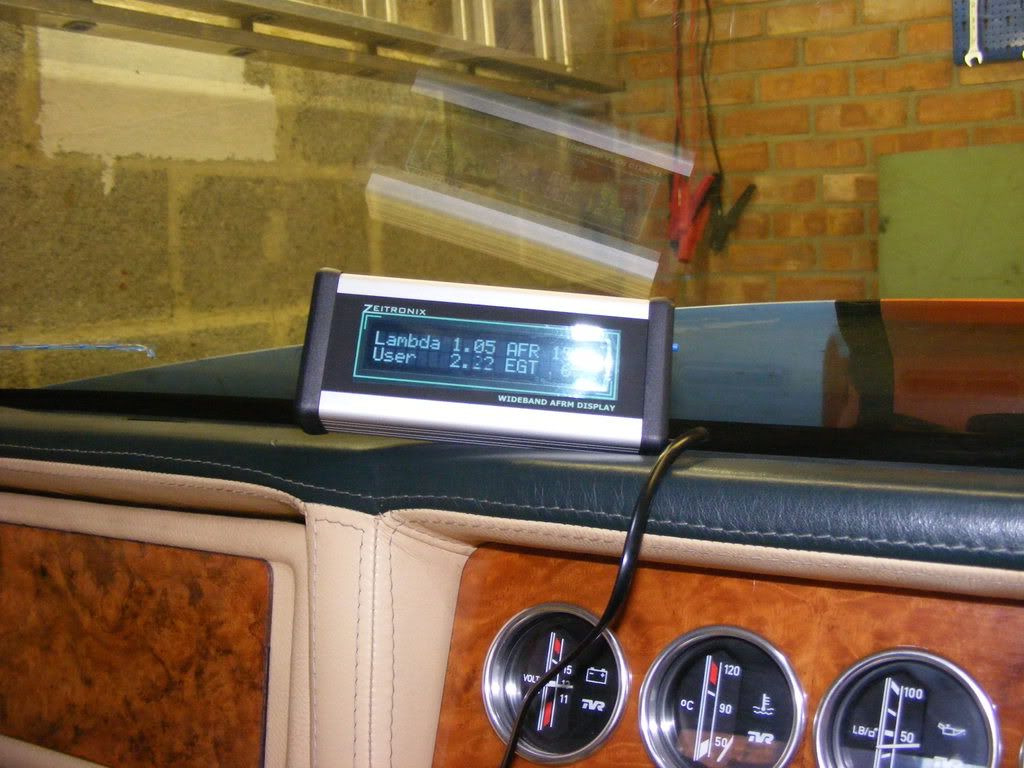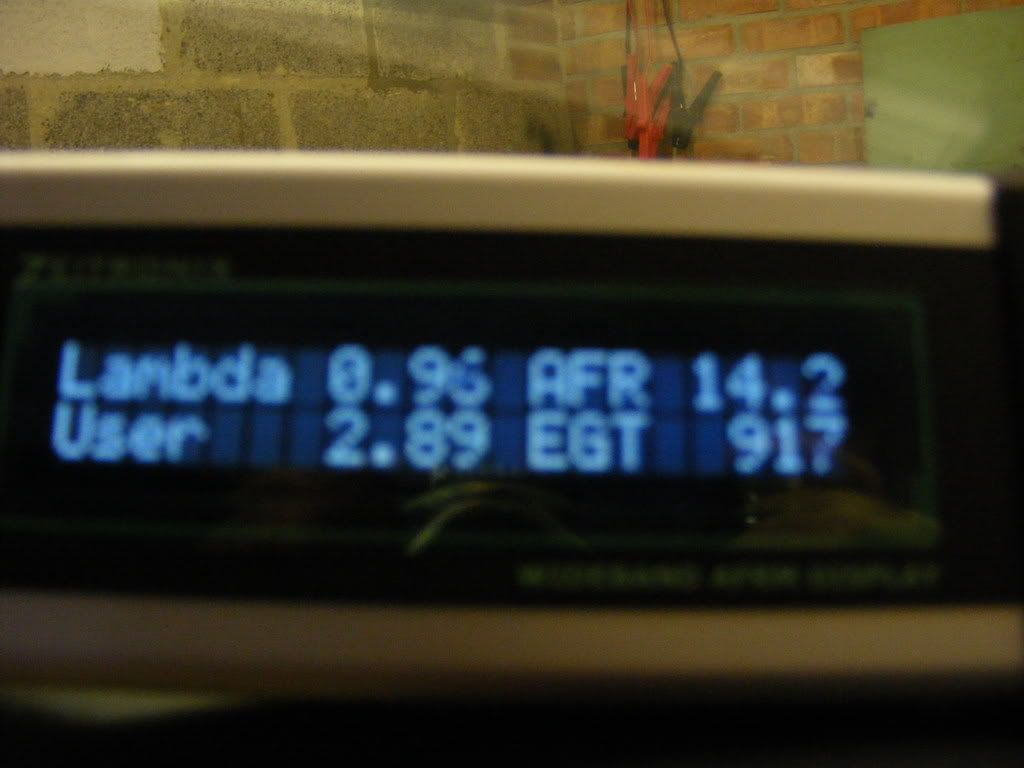Multimeters and thermocouple, connection query
Discussion
Does anyone know of anywhere that sells thermocouple min-plug (flat blade type) to a pair of large round-plugs that are common to most multimeters... but also in the correct thermocouple material (k-type in this case)... I've found male/female adaptors, extensions, bare wire etc, but no plugs to get the reading into my meter without adding another metal change and possibly introducing error.
Thanks for any ideas, I'm a little stuck right now unless I buy a recorder with mini-plug inputs, but it's £90 and my multimeter already has the functionality and rs232 output I need...
Might go have a whinge at Maplins but thought I'd ask here first as I'm assuming these MUST be available somewhere, otherwise any multimeter with temp feature is fairly flawed without the correct plugs.
Cheers
Dave
Thanks for any ideas, I'm a little stuck right now unless I buy a recorder with mini-plug inputs, but it's £90 and my multimeter already has the functionality and rs232 output I need...
Might go have a whinge at Maplins but thought I'd ask here first as I'm assuming these MUST be available somewhere, otherwise any multimeter with temp feature is fairly flawed without the correct plugs.
Cheers
Dave
Googling for thermocouple multimeter adaptor seems to bring up plenty of results...
But really... as long as the metal changes are the same on both wires and are at the same temperatures, it's OK, as the thermocouple potentials they generate will be equal and opposite and so will cancel out.
But really... as long as the metal changes are the same on both wires and are at the same temperatures, it's OK, as the thermocouple potentials they generate will be equal and opposite and so will cancel out.
Pigeon said:
But really... as long as the metal changes are the same on both wires and are at the same temperatures, it's OK, as the thermocouple potentials they generate will be equal and opposite and so will cancel out.
Ahhhh, key information there... I read up on a few sites about thermocouples but they didn't mention that... it seemed like I needed to have the appropriate material right back to the measurement device (meter)...What I'm measuring hardly needs to be THAT accurate anyway, as long as the error is generally consistent, even 5% inaccuracy over my range would be nothing excessive to worry about (air temps and oil temps)
Sounds like if I just buy a female minature block and then wire it to the two generic multimeter plugs that came with my cheap thermocouple I'll be ok then

PS, Googled "adaptor" with the rest and still didn't see anything too great. Maybe I'm looking for something that doesn't exist for the very reason you mention

Cheers
Dave
Mr Whippy said:
Pigeon said:
But really... as long as the metal changes are the same on both wires and are at the same temperatures, it's OK, as the thermocouple potentials they generate will be equal and opposite and so will cancel out.
Ahhhh, key information there... I read up on a few sites about thermocouples but they didn't mention that... it seemed like I needed to have the appropriate material right back to the measurement device (meter)...What I'm measuring hardly needs to be THAT accurate anyway, as long as the error is generally consistent, even 5% inaccuracy over my range would be nothing excessive to worry about (air temps and oil temps)
Sounds like if I just buy a female minature block and then wire it to the two generic multimeter plugs that came with my cheap thermocouple I'll be ok then

PS, Googled "adaptor" with the rest and still didn't see anything too great. Maybe I'm looking for something that doesn't exist for the very reason you mention

Cheers
Dave
You could theoretically use a thermistor in the resistance mode, but you will need to calculate the actual temperature yourself and manually calibrate to know effectively your gains and offsets.
My multimeter has a temp capability onboard (UT60E from Maplin http://www.maplin.co.uk/Module.aspx?ModuleNo=46458 )
Without any plugs in it gives current air temp, so I guess it uses that as a reference point, somehow, for the calibration and accurate temp representation.
Either way, I probed the kettle boiling and recorded it on my PC (fun), and it got to 96degC on the probe (steel rod type), before plateauing and then slowly dropping.
However, when I did my armpit for a while it only got to about 34degC (took a while to settle, got to 30 really quick though), so I guessed maybe it was reading about 4degC under ish... so started looking for error issues.
Anyway, as long as I'm not adding huge errors (10%+) by using same connector types on opposing poles to the meter, then it's accurate enough for my needs!
Just need to find a good probe that I can slot down instead of my oil dipstick, tc.co.uk have oodles of them, tempted by their bearing style probe, as it'll sit nicely at the bottom on the stainless braided wire, and then I can make a bung at the top... just not sure how fast it responds to temp change (though I guess the general sump oil temp is never going to react quickly anyway due to the large heat sinking ability)
Thanks
Dave
Without any plugs in it gives current air temp, so I guess it uses that as a reference point, somehow, for the calibration and accurate temp representation.
Either way, I probed the kettle boiling and recorded it on my PC (fun), and it got to 96degC on the probe (steel rod type), before plateauing and then slowly dropping.
However, when I did my armpit for a while it only got to about 34degC (took a while to settle, got to 30 really quick though), so I guessed maybe it was reading about 4degC under ish... so started looking for error issues.
Anyway, as long as I'm not adding huge errors (10%+) by using same connector types on opposing poles to the meter, then it's accurate enough for my needs!
Just need to find a good probe that I can slot down instead of my oil dipstick, tc.co.uk have oodles of them, tempted by their bearing style probe, as it'll sit nicely at the bottom on the stainless braided wire, and then I can make a bung at the top... just not sure how fast it responds to temp change (though I guess the general sump oil temp is never going to react quickly anyway due to the large heat sinking ability)
Thanks
Dave
I'd take a wild stab in the dark that the multimeter referenced's temperature mode is for use with a thermister. To accurately use a thermocouple, you'd need not only the correct material used in the cables, but also cold junction compensation and an amplifier as the output from a thermocouple is a very low voltage in proportion to the temperature as opposed to a thermistor's change in resistance.
Considering the termperature ranges involved of sump oil temperature, a thermistor would be more than adequate. Thermocouples tend to be used for exhaust gas temps or the like that have much greater temperatures.
Considering the termperature ranges involved of sump oil temperature, a thermistor would be more than adequate. Thermocouples tend to be used for exhaust gas temps or the like that have much greater temperatures.
Edited by anonymous-user on Tuesday 21st October 11:46
LexSport said:
I'd take a wild stab in the dark that the multimeter referenced's temperature mode is for use with a thermister. To accurately use a thermocouple, you'd need not only the correct material used in the cables, but also cold junction compensation and an amplifier as the output from a thermocouple is a very low voltage in proportion to the temperature as opposed to a thermistor's change in resistance.
Considering the termperature ranges involved of sump oil temperature, a thermistor would be more than adequate. Thermocouples tend to be used for exhaust gas temps or the like that have much greater temperatures.
Hmmm, it came with a thermocouple though, and having a 2nd thermocouple of the same ball tip design giving similar readings, I am guessing it is actually one (ie, corrected for k-type thermocouples). But yes, I agree, the documentation with the device wasn't so great, I'm *guessing* it's main use is only for K-type because it has no way to setup for any different... I think the amplifier is built in... if I monitored mV readout it was the right range for the temp displayed for a k-type... (I'm guessing the specific degC mode uses a proper correction, or some correction at least Considering the termperature ranges involved of sump oil temperature, a thermistor would be more than adequate. Thermocouples tend to be used for exhaust gas temps or the like that have much greater temperatures.
Edited by LexSport on Tuesday 21st October 11:46
 )
)I have had my eye on a two temp logging device from tc.co.uk, rs232 output too, and proper miniature plugs... just that a second multimeter with a second input is much more handy, because it can (I think) do two temps, a temp and a sensor reading, or two sensor readings (ie, rail pressure and rail relief valve duty cycle etc).
Yep, I've looked at other temp monitoring devices, it's just that this one tool can do the full range I want to do, from air temps out to EGT, and then also watch my engine sensors and log them...
Anyway, I'll check with the thermcouples I have now and make sure it's reading right. My probe one measured a candle flame at 650degC or so, and the boiling kettle at 94-96degC ish, so I think it's about right so far...
Dave
Your multimeter will need to have a temperature sensor internally to allow the thermocouple interface to measure the cold junction temperature.
I think what you might be asking for is FLUKE - 80AK-A - ADAPTOR
Or
Fluke Site
Adapts a K-type thermocouple mini-connector to dual banana plug inputs.
I think what you might be asking for is FLUKE - 80AK-A - ADAPTOR
Or
Fluke Site
Adapts a K-type thermocouple mini-connector to dual banana plug inputs.
hab1966 said:
Your multimeter will need to have a temperature sensor internally to allow the thermocouple interface to measure the cold junction temperature.
I think what you might be asking for is FLUKE - 80AK-A - ADAPTOR
Or
Fluke Site
Adapts a K-type thermocouple mini-connector to dual banana plug inputs.
I think it has an internal sensor, as with no plugs inserted and on temp mode it accurately reads the ambient air temperature... is that right?I think what you might be asking for is FLUKE - 80AK-A - ADAPTOR
Or
Fluke Site
Adapts a K-type thermocouple mini-connector to dual banana plug inputs.
Anyway, pretty sure it's right enough, as it got my kettle at 95 degC give or take, and room temp about right... I'll do some more testing/logging when I have time, make sure the K-types I have are logging realistic values for some things of fairly well known temps

I did look at the Fluke stuff, that adaptor, a £150 Fluke, and some Fluke thermocouples, but it just seemed very expensive, and didn't even have a logging feature.
I can get a dedicated four channel data/rs232 pc logger from TC.com with miniature plug inputs for less than just the fluke meter on it's own... (though as a meter the Fluke ones are good... but logging is too useful a feature for me, as I can't watch a meter while I drive, and analysing data off a meter is pretty naff vs throwing it all in excel with OBD data and G-tech data etc etc)
Dave
Gassing Station | Engines & Drivetrain | Top of Page | What's New | My Stuff





